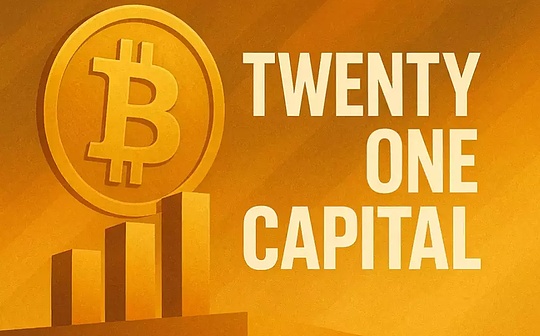Author: Scof,
Edit: TB,
Today, Cantor Fitzgerald, a veteran US investment bank, will launch a Bitcoin investment plan of up to $3 billion, with Tether, Bitfinex and SoftBank, intending to form a company focused on directly holding Bitcoin - 21 Capital. The plan, led by Brandon Lutnick, the son of U.S. Commerce Secretary Howard Lutnick and current chairman of Cantor, is being regarded by the industry as a new version of MicroStrategy.
The new company plans to track market performance by holding Bitcoin and will continue to expand its positions through multiple rounds of financing. The news has not been officially released, but according to multiple parties, the relevant cooperation is close to finalization.
The leader has a special identity and its resource integration ability has attracted attention
Brandon Lutnick is the chairman of Cantor Fitzgerald and head of several SPACs. He graduated from Stanford University and worked in the stock trading divisions of Oak Hill Advisors and Cantor, and is considered to have a strong financial operation background.
But what attracted the market special attention was his family background. Brandon Lutnick's father, Howard Lutnick, is currently the U.S. Secretary of Commerce, while Cantor Fitzgerald has long maintained business ties with Tether, including managing its reserve assets, holding convertible bonds it issues. Bloomberg has disclosed that Brandon has helped Tether reach right-wing platform Rumble and led to its $775 million investment.
In this cooperation, Brandon has raised $200 million through its Cantor Equity Partners in January this year, laying the foundation for the subsequent formation of 21 Capital. Sources said that the funds will be used as startup capital to cooperate with subsequent large-scale digital currency injections.
Clear capital structure, benchmark MicroStrategy
According to the information disclosed at present, 21 Capital will invest a total of US$3 billion in Bitcoin by three parties: Tether invested 1.5 billion, SoftBank invested 900 million, and Bitfinex invested 600 million. It is worth mentioning that Tether and Bitfinex belong to the same parent company and have a cross-management team.
In addition to digital currency investment, 21 Capital also plans to continue to expand its Bitcoin holdings by issuing $350 million convertible bonds and $200 million private equity. This strategy is similar to MicroStrategy: first raise funds through the capital market, then concentrate on buying Bitcoin, and use BTC as the company's core assets to support valuation.
In the future, the above-mentioned investors will convert the Bitcoin injected into 21 Capital shares, with a conversion price of US$10 per share, corresponding to the valuation of Bitcoin of approximately US$85,000 per coin. This also means that 21 Capital is trying to establish a public transaction structure with Bitcoin as the underlying asset.
The company aims to become a "publicly listed Bitcoin investment platform" that enables traditional investors to indirectly hold BTC through stocks. This structure has become increasingly popular worldwide in recent years, and companies such as Japan's Metaplanet have adopted a similar approach to layout.
The motivation of the partners is complex, and the market influence cannot be ignored
The motivation behind this cooperation may not be limited to simple "currency speculation".
SoftBank has previously invested actively in the AI field and has returned to the crypto market this time, which has attracted a lot of attention. The market still remembers that Masayoshi Son bought Bitcoin at a high point in 2017, and eventually left the market with a loss of more than $130 million, and has not been involved for many years since then. But this time he chose to join forces with Cantor and Tether, which makes people wonder if he intends to use this to leverage a larger digital financial layout?
Tether’s role is even more subtle. As a stablecoin issuer, its status has been under compliance pressure and market doubts for a long time, but has invested in agriculture, AI, and even brain-computer interfaces in the past year, and is intending to gradually transform into a "digital asset holding company". Now bound to SoftBank and Cantor may also be an attempt to use its political and capital channels in the United States to strengthen its presence in the United States.
Some market analysts believe that the combination of Tether and SoftBank may form a "dollar liquidity arbitrage structure": Tether issues USDT, and SoftBank invests in high-volatility assets through low-interest financing, driving the additional issuance and demand cycle of USDT. Although it is still a hypothesis, it has operational space in structure.
At the same time, Cantor's long-term relationship with Tether, coupled with the intervention of the Secretary of Commerce's family, has led many investors to speculate that this operation may have "get the signal". A market observer even commented: "First it was MicroStrategy, now it was Cantor, Tether, SoftBank, is the next national team?"
Although cooperation is close to being reached, the final structure remains variable and regulation remains a potential uncertainty. Tether and Bitfinex reached a settlement with U.S. regulators in 2021 over information disclosure issues. Now that we are preparing to build a public trading platform, how to ensure compliance will be the focus of observation.
Conclusion
21 The emergence of Capital marks a new stage in the "bitcoin assetization" trend. Compared with individuals or private equity to buy coins, this operating model supported by large institutions and public structures may have a profound impact on market liquidity, valuation logic, and even regulatory attitudes. Whether it can copy or even surpass MicroStrategy's market effect in the future remains to be seen, but there is no doubt that this project is becoming an important variable in the next stage of the Bitcoin market.
















No comments yet